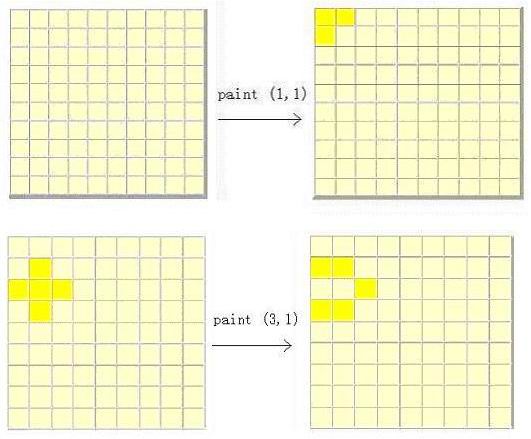Painter's Problem
| Time Limit: 1000MS | Memory Limit: 10000K | |
| Total Submissions: 4912 | Accepted: 2385 |
Description
There is a square wall which is made of n*n small square bricks. Some bricks are white while some bricks are yellow. Bob is a painter and he wants to paint all the bricks yellow. But there is something wrong with Bob's brush. Once he uses this brush to paint brick (i, j), the bricks at (i, j), (i-1, j), (i+1, j), (i, j-1) and (i, j+1) all change their color. Your task is to find the minimum number of bricks Bob should paint in order to make all the bricks yellow.


Input
The first line contains a single integer t (1 <= t <= 20) that indicates the number of test cases. Then follow the t cases. Each test case begins with a line contains an integer n (1 <= n <= 15), representing the size of wall. The next n lines represent the original wall. Each line contains n characters. The j-th character of the i-th line figures out the color of brick at position (i, j). We use a 'w' to express a white brick while a 'y' to express a yellow brick.
Output
For each case, output a line contains the minimum number of bricks Bob should paint. If Bob can't paint all the bricks yellow, print 'inf'.
Sample Input
2 3 yyy yyy yyy 5 wwwww wwwww wwwww wwwww wwwww
Sample Output
0 15
这道题目也是高斯消元法的经典题目,但是和之前的题目想比有些不同。
之前的开关问题在经过高斯消元后,只需要统计其中自有变量的个数,在进行移位运算即可;
在这道题中,需要解决的是在高斯消元后,若只有唯一解则,统计变化的旗子个数,若有多个解即有自由变量
那么要枚举自由变量的所有可能,取最小值。
代码:
#include<iostream>
#include<cstdio>
#include<cstring>
#include<cmath>
#include<cstdlib>
#include<algorithm>
using namespace std;
const int maxn=300;
int a[maxn][maxn];
int x[maxn];
int free_x[maxn];
int free_num;
int equ,var;
int gauss()
{
int i,j,k,col,max_r;
free_num=0;
for(k=0,col=0;k<equ&&col<var;k++,col++)
{
max_r=k;
for(int i=k+1;i<equ;i++)
{
if(abs(a[i][col])>abs(a[max_r][col]))
max_r=i;
}
if(a[max_r][col]==0)
{
k--;
free_x[free_num++]=col;
continue;
}
if(max_r!=k)
{
for(int j=col;j<var+1;j++)
swap(a[k][j],a[max_r][j]);
}
for(int i=k+1;i<equ;i++)
{
if(a[i][col]!=0)
{
for(int j=col;j<var+1;j++)
a[i][j]^=a[k][j];
}
}
}
for(int i=k;i<equ;i++)
{
if(a[i][col]!=0)
return -1;
}
if(k<var)
return var-k;
for(int i=var-1;i>=0;i--)
{
x[i]=a[i][var];
for(int j=i+1;j<var;j++)
x[i]^=(a[i][j]&&x[j]);
}
return 0;
}
void init(int r)
{
memset(a,0,sizeof(a));
memset